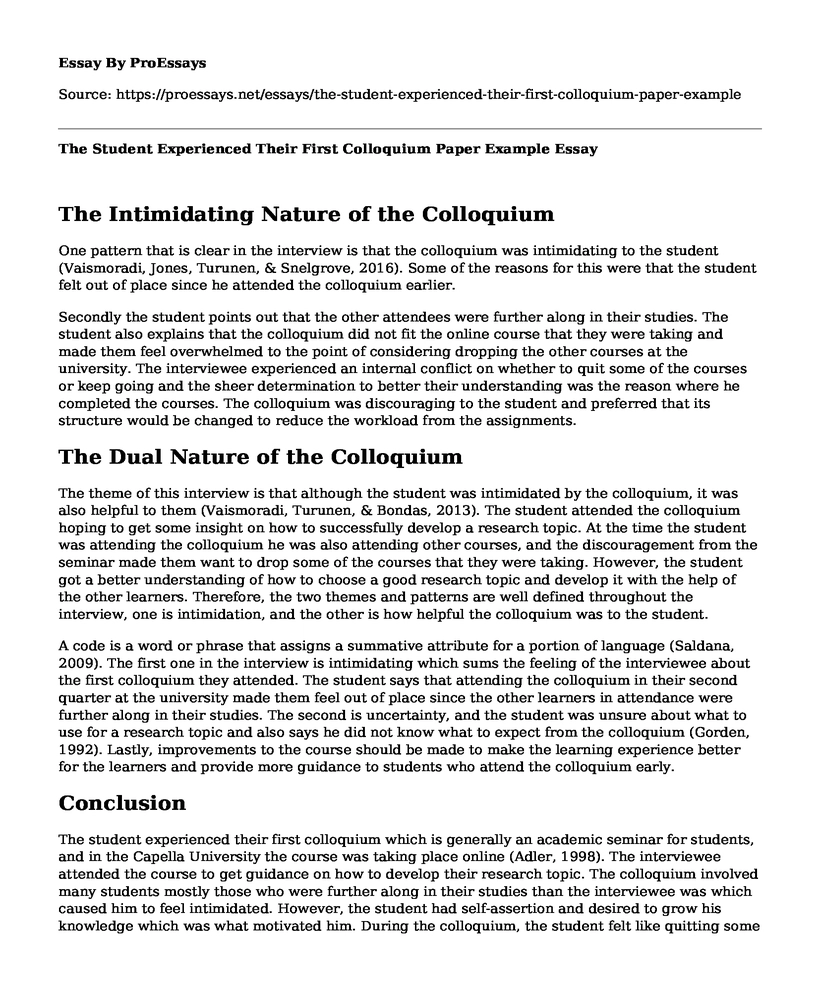The Intimidating Nature of the Colloquium
One pattern that is clear in the interview is that the colloquium was intimidating to the student (Vaismoradi, Jones, Turunen, & Snelgrove, 2016). Some of the reasons for this were that the student felt out of place since he attended the colloquium earlier.
Secondly the student points out that the other attendees were further along in their studies. The student also explains that the colloquium did not fit the online course that they were taking and made them feel overwhelmed to the point of considering dropping the other courses at the university. The interviewee experienced an internal conflict on whether to quit some of the courses or keep going and the sheer determination to better their understanding was the reason where he completed the courses. The colloquium was discouraging to the student and preferred that its structure would be changed to reduce the workload from the assignments.
The Dual Nature of the Colloquium
The theme of this interview is that although the student was intimidated by the colloquium, it was also helpful to them (Vaismoradi, Turunen, & Bondas, 2013). The student attended the colloquium hoping to get some insight on how to successfully develop a research topic. At the time the student was attending the colloquium he was also attending other courses, and the discouragement from the seminar made them want to drop some of the courses that they were taking. However, the student got a better understanding of how to choose a good research topic and develop it with the help of the other learners. Therefore, the two themes and patterns are well defined throughout the interview, one is intimidation, and the other is how helpful the colloquium was to the student.
A code is a word or phrase that assigns a summative attribute for a portion of language (Saldana, 2009). The first one in the interview is intimidating which sums the feeling of the interviewee about the first colloquium they attended. The student says that attending the colloquium in their second quarter at the university made them feel out of place since the other learners in attendance were further along in their studies. The second is uncertainty, and the student was unsure about what to use for a research topic and also says he did not know what to expect from the colloquium (Gorden, 1992). Lastly, improvements to the course should be made to make the learning experience better for the learners and provide more guidance to students who attend the colloquium early.
Conclusion
The student experienced their first colloquium which is generally an academic seminar for students, and in the Capella University the course was taking place online (Adler, 1998). The interviewee attended the course to get guidance on how to develop their research topic. The colloquium involved many students mostly those who were further along in their studies than the interviewee was which caused him to feel intimidated. However, the student had self-assertion and desired to grow his knowledge which was what motivated him. During the colloquium, the student felt like quitting some of the courses but through determination, those feelings were transformed, and he completed the courses (Moustakas, 1994). The colloquium usually involves lecturers from different people, and the attendees have some assignments to do at the end. Besides, the learners also have presentations about the topics that have been discussed during the colloquium which were of great help to the interviewee.
References
Adler, P. (1998). Beyond Cultural Identity: Reflections on Multiculturalism. Basic concepts of intercultural communication, 225-245. Retrieved from https://larocco2011.pressbooks.com/back-matter/appendix-i-thank-you-letter-to-participants-requesting-participant-validation-of-results/
Gorden, R. L. (1992). Basic Interviewing Skills. San Fransisco: F.E. Peacock Publishers. Retrieved from https://books.google.co.ke/books/about/Basic_Interviewing_Skills.html?id=gI2tQgAACAAJ&redir_esc=y
Moustakas, C. (1994). Phenomenological Research Methods. Thousand Oaks: SAGE Publications. Retrieved from https://books.google.co.ke/books?id=QiXJSszx7-8C&source=gbs_navlinks_s
Saldana, J. (2009). The coding manual for qualitative researchers. Thousand Oaks, CA: Sage Publications Ltd. Retrieved from https://www.sagepub.com/sites/default/files/upm-binaries/24614_01_Saldana_Ch_01.pdf
Vaismoradi, M., Jones, J., Turunen, H., & Snelgrove, S. (2016). Theme development in qualitative content analysis and thematic analysis. Journal of Nursing Education and Practice, 6(5), 100-110. Retrieved from http://jnep.sciedupress.com
Vaismoradi, M., Turunen, H., & Bondas, T. (2013). Content analysis and thematic analysis: Implications for conducting a qualitative descriptive study. Nursing and Health Sciences, 15, 398-405. doi:10.1111/nhs.12048
Cite this page
The Student Experienced Their First Colloquium Paper Example. (2022, Aug 01). Retrieved from https://proessays.net/essays/the-student-experienced-their-first-colloquium-paper-example
If you are the original author of this essay and no longer wish to have it published on the ProEssays website, please click below to request its removal:
- Self-Reflection Report: Academic Interest in Journalism
- Tools to Help Nurses Gain Critical Thinking Skills Essay
- Translators: Balancing Acceptability and Accuracy - Research Paper
- Essay Example on The Encephalon: A Vital Key to Understanding Ourselves
- Essay Sample on Parental Surveillance: Protecting Children or Violating Privacy
- Observational Learning in Childhood - Free Research Paper Sample
- Essay Example on Children's Vaccination







